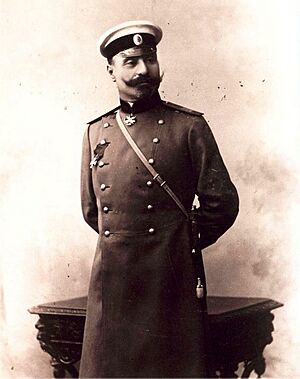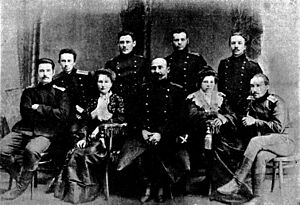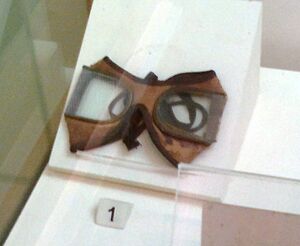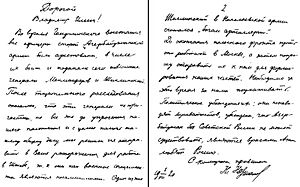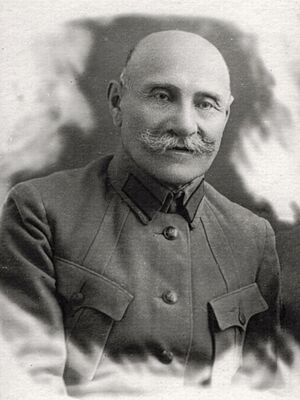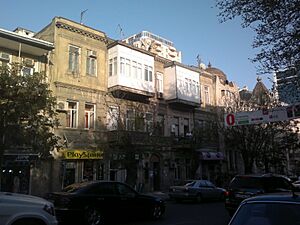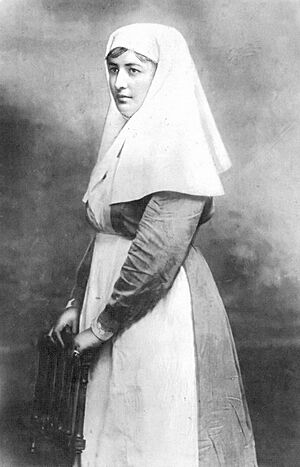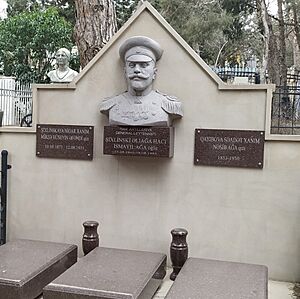Aliagha Shikhlinski facts for kids
Quick facts for kids
Ali Agha Shikhlinski
|
|
|---|---|
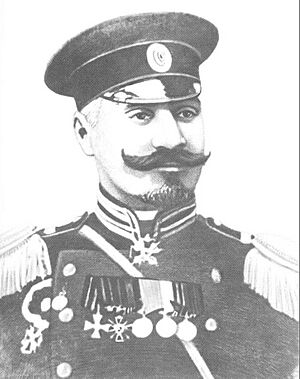 |
|
| Nickname(s) | "The God of the Artillery" |
| Born | March 3, 1863 Kazakh (now Ashaghy Salahly), Kazakhsky Uyezd, Elisabethpol Governorate, Russian Empire |
| Died | August 18, 1943 (aged 80) Baku, Azerbaijan SSR, USSR |
| Buried |
Yasamal cemetery
(40°21′49″N 49°48′36″E / 40.3636837°N 49.8099878°E) |
| Allegiance | |
| Service/ |
Imperial Russian Army Azerbaijan National Army |
| Years of service | 1886–1929 |
| Rank | |
| Commands held | 5th Battery, 29th Artillery Brigade 1st Division, 21st Artillery Brigade 10th Army |
| Battles/wars | Boxer Rebellion Russo-Japanese War
|
| Awards | |
| Spouse(s) | Nigar Shikhlinskaya |
Ali Agha Shikhlinski (born March 3, 1863 – died August 18, 1943) was a very important military leader from Azerbaijan. People often called him "The God of the Artillery" because he was so good at using cannons in battles. He served in the armies of the Russian Empire, the Azerbaijan Democratic Republic, and the Soviet Union.
Contents
Ali Agha Shikhlinski: A Military Leader
Growing Up
Ali Agha Shikhlinski was born in 1863 in a village called Ashaghy Salakhly. His family, the Shikhlinski Dynasty, was a noble family with a long history. His mother was the grandchild of Molla Vali Vidadi, a famous poet from the 1700s. Ali Agha also had two brothers.
Starting His Military Journey
In 1876, Ali Agha started at the Tiflis military school. He graduated in 1883 and continued his studies at the Mikhailovsky Artillery Academy in Saint Petersburg. He was a very talented student, especially in horse riding and gymnastics.
After finishing his studies in 1886, he became a junior officer (called a podporuchik). He was sent to the 39th Artillery Brigade. Over time, he earned higher ranks like poruchik and shtabs-kapitan. In 1900, he moved to Eastern Siberia to join the Transbaikal Artillery Battalion. He became a Battery Chief, leading a group of cannons. He also took part in a military mission in China.
Fighting in the Russo-Japanese War
During the Russo-Japanese War, Ali Agha Shikhlinski was in charge of an artillery battery. He showed great bravery during the Siege of Port Arthur. Even though he was badly wounded in his leg, he kept aiming the cannons himself when his team was unable to. This helped push back the Japanese attacks.
For his courage in battle, he received the Order of St. George, a very high military award, in 1905. He also received a special sword and was promoted to the rank of lieutenant-colonel.
Becoming an Artillery Expert
In 1906, Shikhlinski went to the Officer's Artillery College. He did so well that he became an instructor there. During this time, he wrote books about how to use artillery in battles. He also invented a special device to help find targets, which was named the "Shikhlinski triangle."
He was promoted to colonel in 1908 and then to major-general in 1912. He became the deputy chief of the Officer's Artillery College, helping to train many future artillery officers.
Role in World War I
When World War I began in 1914, Ali Agha Shikhlinski was put in charge of the artillery in St. Petersburg. He later helped train soldiers to use heavy artillery. He was given important roles, managing artillery operations on the Western Front. In 1917, he was promoted to the rank of lieutenant-general.
Serving Azerbaijan
After the Russian Revolution in 1917, Ali Agha Shikhlinski became the commander of the 10th Russian army. He later moved to Tbilisi and helped create the Muslim (Azerbaijani) corps. This group supported the Ottoman Army in the Battle of Baku.
In 1919, he became the Deputy Minister of Defense for the new Azerbaijan Democratic Republic. He was promoted to General of the Artillery for the Azerbaijani army. However, when the Red Army took over Azerbaijan in 1920, he was arrested but released two months later.
Later Years with the Red Army
From 1920 to 1921, he worked in Moscow as an adviser for the Red Army's artillery and taught at a military school. In 1921, he returned to Baku and continued teaching at a military school. He also helped lead the military science society in Baku.
In 1926, Shikhlinski published a Russian-Azerbaijani Military Dictionary. He retired from military service in 1929 and spent his time writing his life story.
His Final Days
Ali Agha Shikhlinski spent his last days in his home in Baku. He finished writing his memoirs, "My Memories," in 1942. The book was published in 1944, after his death. A famous military expert, Evgeny Barsukov, wrote the introduction to his book.
Ali Agha Shikhlinski passed away on August 18, 1943. His funeral was a special event, with an orchestra from the Baku Military Garrison playing music.
His Legacy
Ali Agha Shikhlinski is remembered as a great military figure. A short film about him called "The General" was made in 1970. An oil tanker was named after him in 1980. There are also streets named after him in Baku and Qazax.
In 1990, a scholarship was created in his name for university students. A documentary film about him, "Was considered the god of artillery," was released in 2006. In 2014, the President of Azerbaijan ordered a celebration for his 150th birthday.
A famous Russian military expert, Evgeny Barsukov, said that Ali Agha Shikhlinski was one of the few Russian artillery experts who truly understood how to use cannons in battle. He believed that Shikhlinski's skills greatly helped Russian artillery in wars.
Ali Agha Shikhlinski was also a character in two novels by Russian-Soviet writer Alexander Nikolaevich Stepanov: "Port-Arthur" and "Zvonaryov Family." Stepanov wrote that even though Shikhlinski was a high-ranking general, he was humble and had a natural talent for military science.
Films About Him
- The General (1970 film)
- Was Considered The God of Artillery
- Honorable Commander: General Ali Agha Shikhlinski
Honours and Medals
Ali Agha Shikhlinski received many awards for his bravery and service, including:
 Order of Saint Stanislaus (3rd, 2nd, and 1st Class)
Order of Saint Stanislaus (3rd, 2nd, and 1st Class) Order of Saint Anne (3rd, 2nd, and 1st Class, and 4th Class for Bravery)
Order of Saint Anne (3rd, 2nd, and 1st Class, and 4th Class for Bravery) Gold Sword for Bravery
Gold Sword for Bravery Order of Saint George (4th Class)
Order of Saint George (4th Class) Order of Saint Vladimir (4th, 3rd, and 2nd Class)
Order of Saint Vladimir (4th, 3rd, and 2nd Class) Legion of Honour
Legion of Honour
Gallery
-
Ali Agha Shikhlinski in the Imperial Russian Army (Early 20th century)
-
Ali Agha Shikhlinski and his wife Nigar Shikhlinskaya (Early 20th century)
-
Ali Agha Shikhlinski and his wife Nigar Shikhlinskaya (1920's)
-
Mikhail Frunze at combat training of the Azerbaijani Soldiers of the Red Army (April 1925)
See also
- Samad bey Mehmandarov
- Hasan bey Aghayev
- Nasib bey Yusifbeyli


